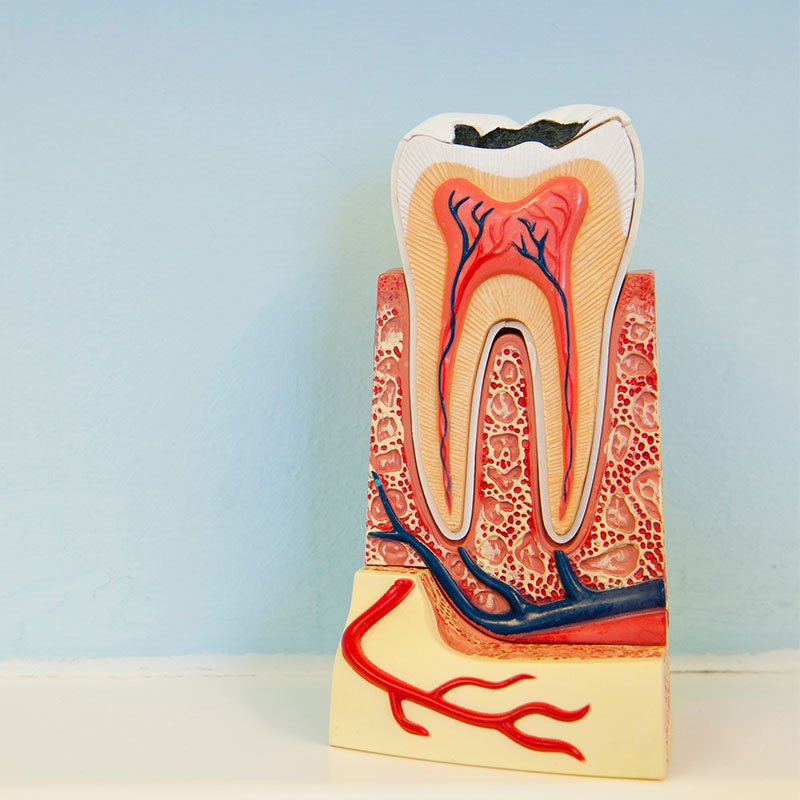Restorative Dentistry
With the use of modern technology and improved techniques, our team is able to restore a tooth back to its normal shape, appearance and function. If you have been suffering from pain caused by decay or other oral health conditions, you may benefit from restorative dentistry.
Dental Crowns
Over time, our teeth begin to weaken and become more susceptible to problems such as decay, cracks or discoloration. Crowns are used to renew the appearance and function of a tooth. Crowns are not limited to just replacing the original tooth, but can be designed to create an even better aesthetic appearance.
Crowns are typically made from porcelain in order to maintain strength and a natural appearance. The process of placing a crown may take 1-2 office visits.
Dental Bridges
A dental bridge is used to replace a missing tooth or teeth. A tooth or teeth neighboring the missing tooth or teeth may be crowned, and used as anchoring teeth to support the replacement tooth. It is important to replace missing teeth to avoid shifting of surrounding teeth, which may lead to a misaligned bite, TMJ, and other problems.
Dental bridges are custom-made to match your natural teeth in color and overall appearance. They are made from mixtures of gold, metal, alloys or porcelain to ensure that they are strong and durable. With appropriate at home and professional care, your dental bridges may last for years.


Dentures
Dentures are beneficial for those who wish to replace all or most of their teeth. They are custom-made to provide a natural appearance and comfortable fit in your mouth. Dentures may restore your confidence and allow you to smile freely. Depending on your need, you may benefit from a full or partial denture
Dental Implants
Dental implants are used to secure partial or complete dentures as well as support for dental bridges. They resemble natural teeth and can completely restore your smile and substantially improve your oral health. The implant, made of titanium, is placed into the jaw. Once fused with natural bone, the crown (false tooth) is secured on the implant. Implants have the same dependable foundation as natural tooth roots. With permanently placed implants, you will no longer have to experience discomfort in chewing, laughing or speaking.
Filling Restorations
“Tooth colored” fillings are just one of the options available when a tooth develops a cavity. They provide good durability and can help the tooth resist a fracture when it is a small- to mid-size filling. They are more natural looking and are less noticeable than other types of fillings, and they can be placed on front or back teeth.
Of course, the best type of filling is no filling at all which is why excellent at-home oral hygiene and maintaining routine dental cleanings and exams is so critically important.
Extractions
An extraction means having a tooth pulled, and is usually required when a tooth is fractured or decayed beyond repair or sometimes to create room for other teeth to become properly aligned.
Dr. Sarver is experienced with and performs most kinds of extractions, with the exception of impacted wisdom teeth. As with all procedures, we will be sure to discuss the process thoroughly with you beforehand, making sure you are familiar with post-operative instructions as well as tooth replacement options for the missing tooth.


Root Canals
Root canals are necessary when the inner-most layer of your tooth (pulp) becomes diseased or inflamed. Teeth may need root canals due to deep cavities, numerous fillings, cracks, or trauma. A root canal is the process of removing the diseased pulp from the tooth to help it function normally again. After the pulp is removed, the inside of the tooth is cleaned out thoroughly and sealed off.
Most of the time, root canals are a very simple, straightforward procedure with little to no discomfort that can be done in one or two visits. If you continue to take good care of your teeth and gums, teeth with root canals can last a lifetime. It is especially important to have regular checkups and cleanings after a root canal, as a tooth without the nerve can still develop a cavity and gum disease.
Dr. Sarver performs root canals in most situations, though a referral to an endodontist (root canal specialist) will be necessary for more complex cases.
Periodontal Disease – Prevention and Maintenance
Periodontal disease (periodontitis) is the leading cause of tooth loss and can be caused by genetics, poor oral hygiene and tobacco use. When bacteria start to collect in your mouth, a sticky, colorless substance known as “plaque” develops. If not removed during brushing and flossing, the plaque particles can harden and turn into tartar. Accumulated plaque and tartar may lead to gingivitis, an early form of periodontal disease. When not treated early, gingivitis can lead to periodontal disease. Routine professional cleanings and proper at-home oral care can prevent gingivitis from developing.
Once reaching an advanced stage, periodontitis cannot be completely reversed. With proper at-home care combined with regular in-office maintenance, we can prevent the disease from progressing and leading to tooth loss. A common solution for controlling periodontal disease is a deep dental cleaning, also referred to as “scaling and root planing”. Scaling is the removal of the dental tartar from the tooth surfaces, and root planing is smoothing the root surfaces.
Periodontal maintenance cleaning are recommended every three months and can be performed by our experienced dental hygienists.

